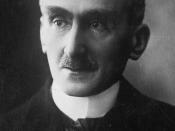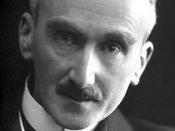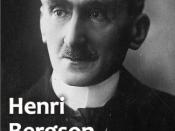HENRI BERGSON
I. Early Life:
Henri Bergson (1859-1941), the son of a Jewish musician and an English woman, was educated at the Lycée Condorcet and the ÃÂcole Normale Supérieure, where he studied philosophy. After a teaching career as a schoolmaster in various secondary schools, Bergson was appointed to the ÃÂcole Normale Supérieure in 1898 and, from 1900 to 1921, held the chair of philosophy at the Collège de France. In 1914 he was elected to the Académie Française; from 1921 to 1926 he was president of the Commission for Intellectual Cooperation of the League of Nations. Shortly before his death in 1941, Bergson expressed in several ways his opposition to the Vichy regime. Bergson's English background explains the deep influence that Spencer, Mill, and Darwin had on him during his youth, but his own philosophy is largely a reaction against their rationalist systems.
Bergson developed his philosophy in a number of books that have become famous not only for their fresh interpretation of life but also for a powerful employment of metaphor, image, and analogy.
In his Essai sur les donnes immédiates de la conscience (1889) [Time and Free Will], Bergson offered an interpretation of consciousness as existing on two levels, the first to be reached by deep introspection, the second an external projection of the first. The deeper self is the seat of creative becoming and of free will. The method of intuitive introspection, first employed in this work, is developed further in his Introduction à la métaphysique (1903 [An Introduction to Metaphysics]. In Matière et mémoire (1896) [Matter and Memory], Bergson once again took up the study of consciousness, turning his attention to the relation of mind to body. He argued that this distinction is one of degree, not of kind. The limiting concept of matter is interpreted...


